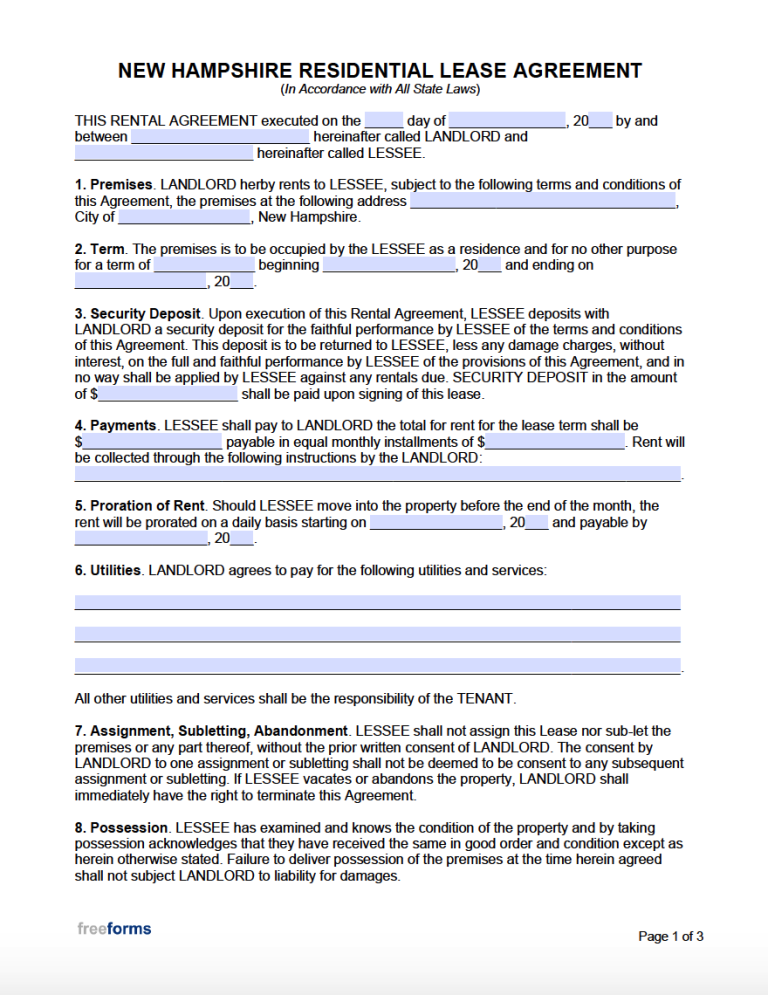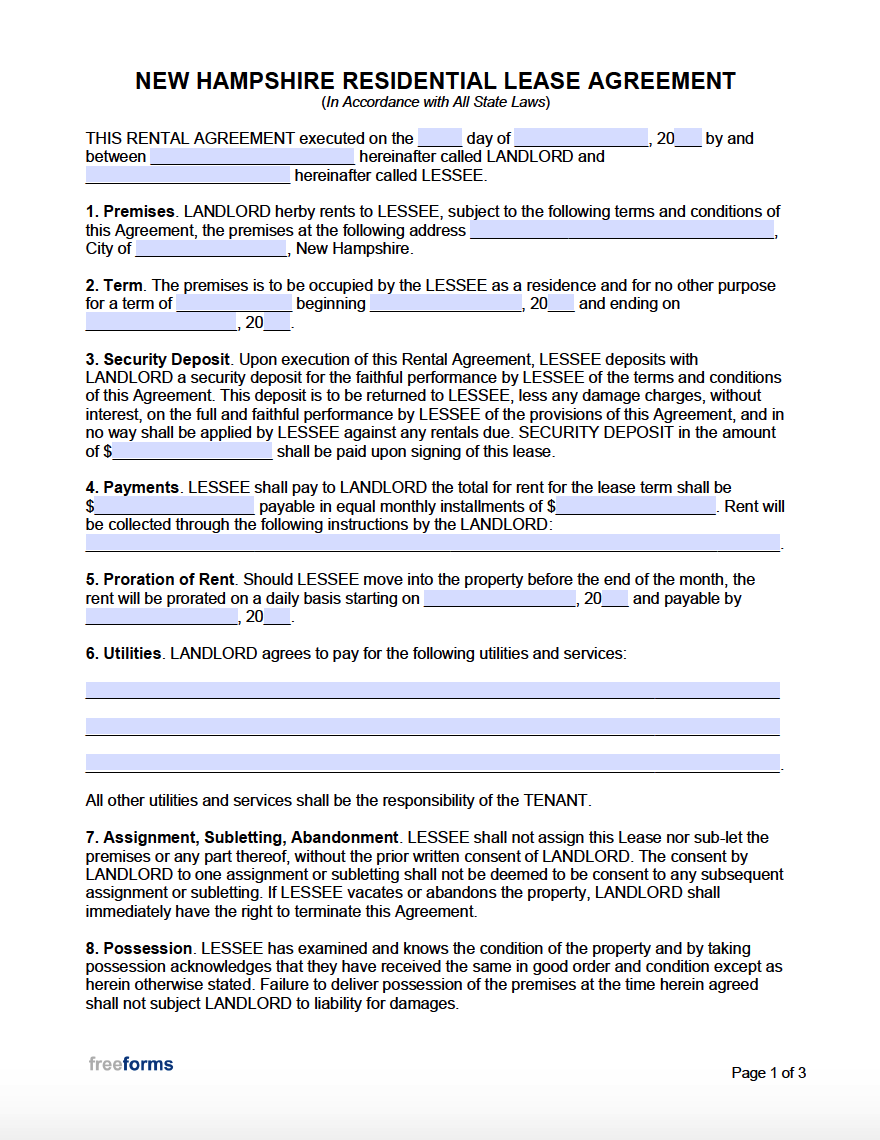Lease Agreements By Type
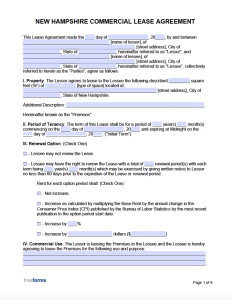 Commercial Lease Agreement – Uses a contract to spell out the specifics involving a company’s use of a property to conduct business activity for a given time and dollar amount.
Commercial Lease Agreement – Uses a contract to spell out the specifics involving a company’s use of a property to conduct business activity for a given time and dollar amount.
Download: PDF, Word (.docx)
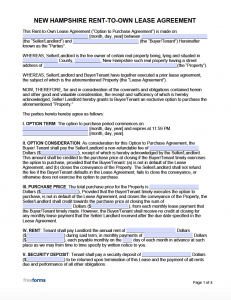 Lease to Own Agreement – Depicts the circumstances regarding the use of a residence for a designated period and payment with the possibility to buy at the end of the leasing obligation.
Lease to Own Agreement – Depicts the circumstances regarding the use of a residence for a designated period and payment with the possibility to buy at the end of the leasing obligation.
Download: PDF, Word (.docx)
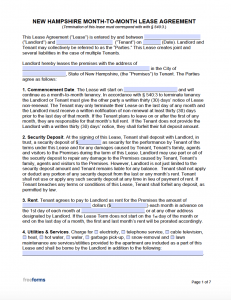 Month-to-Month Lease – Evinces a contract to secure a lease with a total duration that can be nullified prematurely with a written declaration to the alternate party thirty (30) days before terminating.
Month-to-Month Lease – Evinces a contract to secure a lease with a total duration that can be nullified prematurely with a written declaration to the alternate party thirty (30) days before terminating.
Download: PDF, Word (.docx)
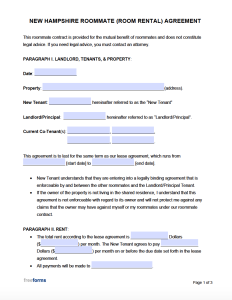 Roommate Agreement – Delivers information regarding the provisions and schedule of a rental agreement where the space is shared between a tenant and another person.
Roommate Agreement – Delivers information regarding the provisions and schedule of a rental agreement where the space is shared between a tenant and another person.
Download: PDF, Word (.docx)
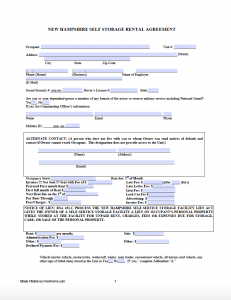 Self Storage Rental Agreement – The owner of a storage unit may use this document to record the terms established between them and an individual looking to rent storage space.
Self Storage Rental Agreement – The owner of a storage unit may use this document to record the terms established between them and an individual looking to rent storage space.
Download: PDF
Standard Lease Agreement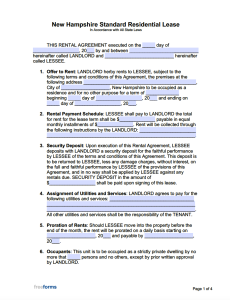 – Employs the use of a written contractual compact to enter into an arrangement to rent a residential space.
– Employs the use of a written contractual compact to enter into an arrangement to rent a residential space.
Download: PDF, Word (.docx)
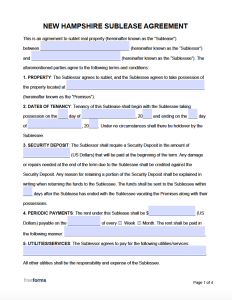 Sublease Agreement – Describes the rental contract between two individuals, one leasing to the other, who will, in turn, be viewed as the subtenant.
Sublease Agreement – Describes the rental contract between two individuals, one leasing to the other, who will, in turn, be viewed as the subtenant.
Download: PDF, Word (.docx)
Additional Forms
Demand for Rent Notice – Landlords may deliver this to tenants who have failed to pay rent for the objective of receiving the full amount of back rent and avoiding the eviction process.
Landlord-Tenant Laws
For further investigation into the complexities involving the rental of residential properties review the legislature on Action Against Tenants § 540-1 and New Hampshire Consumer Sourcebook – Renting, Security Deposits, and Evictions.
Required Landlord Disclosures
Move-In Checklist (§ 540-A:6) – The landlord is obligated to provide the tenant with notice of the requirement to inform the owner of any issues with the property upon moving in. The tenant is allocated five days to supply the landlord with a list of any problems with the property requiring repair, as to not be responsible for them at the end of the lease term.
Lead-Based Paint (42 U.S. Code § 4852d) – Residences that were erected before 1979 will necessitate an extra informational packet disbursement. This disclosure explaining the potential for exposure to lead-based paint and the risks involved must be indicated as received by the lessee upon execution of the contract.
Manufacturing of Methamphetamines on Premises (§ 477:4-g) – Properties that have been utilized to manufacture Methamphetamines, where the owner is aware of its history, must have proper disclosure of the fact.
When is Rent Late?
Payment for the right of use of the rental unit is expected as stated in the lease arrangement paperwork. There is no state regulation permitting a conventional grace period before the landlord can insist upon a late charge (§ 540-1).
Late Fees
There is no governmental restriction on the sum or percentage of the rent that an owner can rightfully request on rent received after the stipulated due date. The fee to be initiated must be determined and agreed to by both parties within the lease agreement for the landlord to be entitled to the payment.
NSF Checks
For cases involving returned or “bad” checks, the owner or managing official must inform the tenant of the problem immediately to remedy the situation. The tenant then has fourteen (14) days to rectify the standing of the payment and all associated NSF check fees to avoid possible felony allegations (§ 638-4).
Security Deposit Maximum
Limitation on the amount that can be proposed to a potential tenant to be held as a security deposit for the property is the greater of the amounts of either one months’ rent or $100 (§ 540-A:6).
Security Deposit Return
Should the home not incur any damages beyond expected building wear and tear, a check for the deposit amount is to be remitted to the tenant to a provided forwarding address within thirty (30) days. For units sustaining damage brought about by the tenant, the landlord will need to provide a register of replacement costs and supporting proof of repairs to be delivered along with the remainder of the deposit to the tenant (§ 540-A:7).
Landlord’s Entry
The owner is allowed access to the dwelling without notice for emergencies and regular maintenance with proper notification before entering. No specific amount of advanced notice is indicated in the legislature wording (§ 540-A:3).
